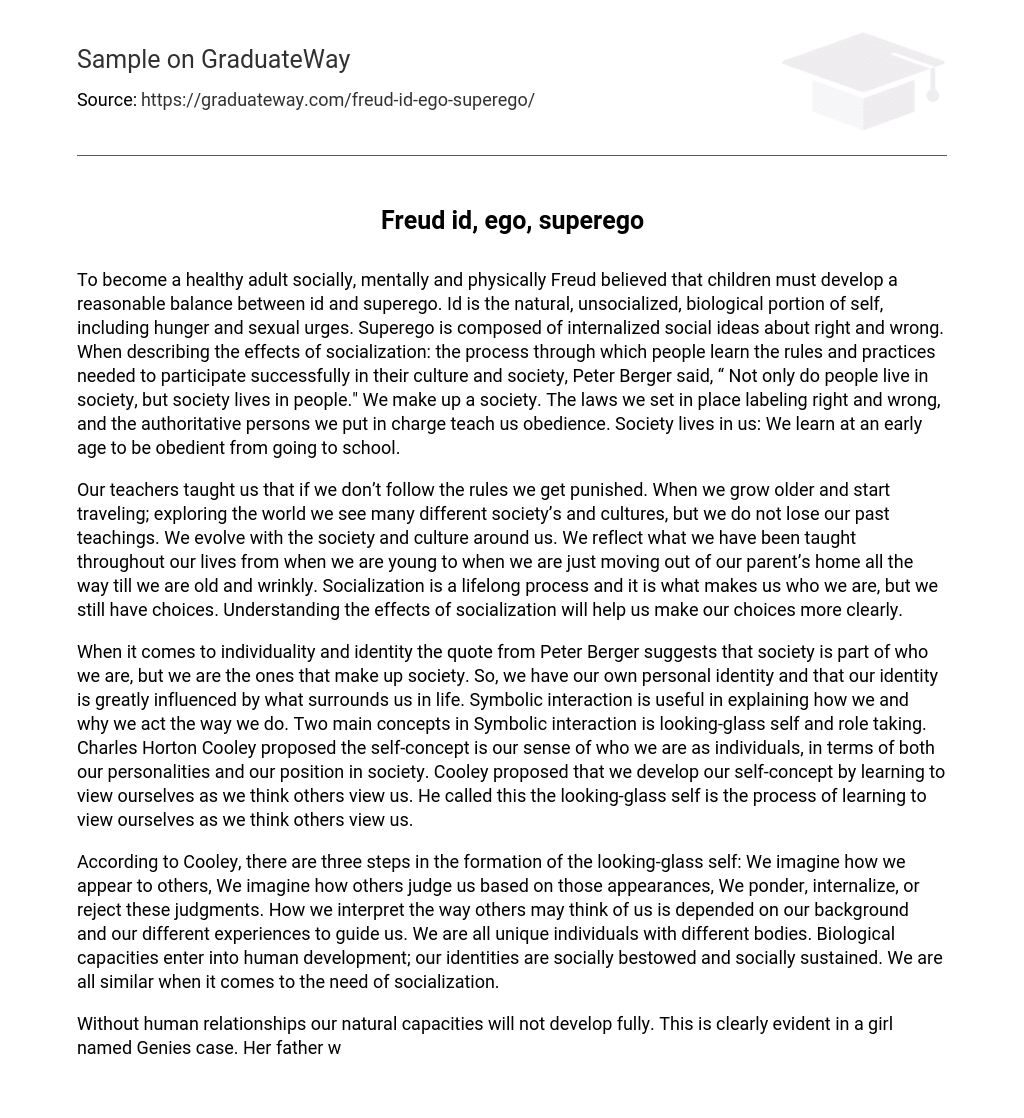Freud believed that children need to find a balance between their natural instincts (id) and societal expectations (superego) in order to become healthy adults. The id represents our biological needs and desires, while the superego is formed by internalizing social ideas of right and wrong.
According to Peter Berger, socialization is how individuals learn the rules and practices necessary for functioning in society. Society not only exists externally but also becomes a part of individuals themselves. We contribute to society through creating laws and obeying authority figures.
Obedience is learned from an early age through attending school, shaping our understanding of society as we grow up.
Despite receiving teachings from our teachers about the outcomes of disobedience, we retain the knowledge as we explore different regions and interact with diverse societies and cultures. From childhood to old age, we constantly adjust and adhere to the societal customs and principles prevalent in our surroundings. Our sense of self is continuously shaped by socialization; however, we still retain the ability to make choices. Acknowledging the influence of socialization empowers us to make well-informed decisions.
Peter Berger’s quote emphasizes the significant role society plays in shaping our individuality and identity, but it is crucial to acknowledge that we also contribute to the creation of society. Therefore, our personal identity is greatly influenced by the surrounding environment. Symbolic interaction theory offers an explanation for our actions and behaviors, focusing on two main concepts: the looking-glass self and role taking. Charles Horton Cooley argues that our self-concept, including personalities and social status, develops through perceiving ourselves as others perceive us. This process, known as the looking-glass self, involves learning to see ourselves based on how we believe others see us.
Cooley proposed a three-step process for the formation of the looking-glass self. First, we mentally picture how others view us. Next, we speculate on how others judge us based on our outward appearances. Finally, we contemplate these assessments and make a decision to either embrace or dismiss them. Our perception of how others perceive us is influenced by our individual backgrounds and experiences. Each person has distinct physical attributes, and their growth is shaped by biological factors as well as societal expectations. Nevertheless, all individuals share a common requirement for socialization.
Human relationships are crucial for the complete development of our innate capacities, as evidenced by Genie, a girl who endured severe abuse and confinement from her father. Her mother, who was blind and disabled, felt powerless in aiding her. Eventually, her mother mustered the courage to escape with Genie. Nevertheless, Genie faced significant delays in development and lacked the ability to communicate, walk, or perform basic tasks like using a toilet.
Although years of therapy did improve some of Genie’s abilities to some extent, they still fell far short of what was necessary for independent living. Despite being an extreme case in Genie’s situation, this demonstrates the profound significance of socialization.
Despite our diverse individuality, we all have shared fundamental needs and requisites. Socialization plays a pivotal role in molding our growth and development while also impacting our freedom by placing limits on our actions, speech, and thoughts without impediment or restraint.
We conform to socially acceptable behavior in our culture, although some argue that we have freedom of choice. However, our choices are limited and deviating from what is socially acceptable can lead to punishment. Nonconformity results in ridicule or punishment for not following social norms. Despite valuing freedom, the United States has laws in place that restrict our actions. According to structural functionalists, schools not only teach children academics but also instill obedience to authority and adherence to societal rules. This perspective is most useful for explaining the benefits of a stable social system. Structural functionalists believe that socialization in schools, religious institutions, families, and other settings effectively integrates young individuals into broader culture, preventing conflict or disruptive social change.
Humans are both products of their culture and active participants in its creation. The knowledge and beliefs we possess are instilled in us by the people within our social environment. However, as individuals, we also play a role in disseminating and merging diverse cultural perspectives, which leads to the emergence of new and varied ideas. The conflict theory provides insight into how socialization processes can suppress opposing viewpoints, hinder societal transformation, and perpetuate inequalities.
The study conducted by conflict theorists focuses on how parents reinforce gender inequality through teaching girls domestic responsibilities such as doing the dishes while allowing boys more freedom for outdoor activities. Understanding these dynamics sheds light on how socialization shapes our perspectives and perpetuates unequal power dynamics within society.
They can also examine how teachers penalize innovation and incentivize conformity. We are shaped by our society; however, our society thrives due to our shared convictions. Our uniqueness and sense of self are evident, although extensively impacted by society. True liberty is constrained by the implicit and explicit regulations dictated by society. Peter Berger’s statement, “Not only do people live in society, but society lives in people,” sheds light on the process of socialization and emphasizes that individuals do not exist in isolation, just as society does not exist independently – everything is interconnected.





